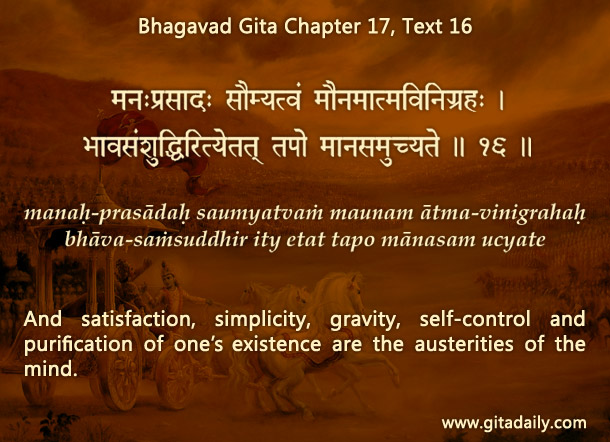The sentiment of contentment is sometimes seen negatively. Some people think of it as the symptom of laziness and the cause of stagnation — they hold that people who are content won’t strive to improve themselves or the world around them. For example, consider someone who lives on welfare, never holding any responsible job, and being satisfied merely in playing video games, watching porn, and doing drugs.
While such people may appear content, their condition is best described not as contentment but confinement. They are confined to the prison they have created through their own lethargy and apathy. The Bhagavad-gita (18.39) refers to such perverse pleasure as pleasure in the mode of ignorance.
Contentment, in the positive sense of the word, is far from confinement; it is refinement — of insight and taste. As their insight gets refined, they understand the superficiality and hollowness of worldly pleasures — and they seek something transcendental. They recognize that there must be something higher, something better, something deeper that is truly worth pursuing. They step off the rat race of chasing after material things and sensual thrills — not because they are too lazy to pursue those things, but because they are too busy pursuing transcendental things.
As their refinement of insight is complemented by refinement of taste, they start finding joy within themselves by realizing their own indestructible spirituality and especially their innate connection with the divine, whom the Gita knows by the name Krishna. Those who are thus content soon become busy, but with a big difference: they are busy sharing the fullness and richness of their lives with others out of concern and compassion, not busy pursuing temporarily titillating things out of insatiable craving. This indeed is the contentment recommended in the Bhagavad-gita as a discipline of the mind (17.16).
Summary:
Contentment that arises from indolence results in confinement — such people are too lazy to do anything worthwhile; contentment that arises from transcendence results in refinement — such people are too busy pursuing the things that matter most to be caught in pursuing lesser things.
Think it over:
- Why is contentment sometimes seen negatively?
- How is such contentment different from positive contentment?
- How can that positive contentment be developed?
Audio explanation: https://gitadaily.substack.com/p/two-kinds-of-contentment-and-how
***
17.16: And satisfaction, simplicity, gravity, self-control and purification of one’s existence are the austerities of the mind.
To know more about this verse, please click on the image


Very nice and thoughtful explanation. Thank you.
Happy to be of service